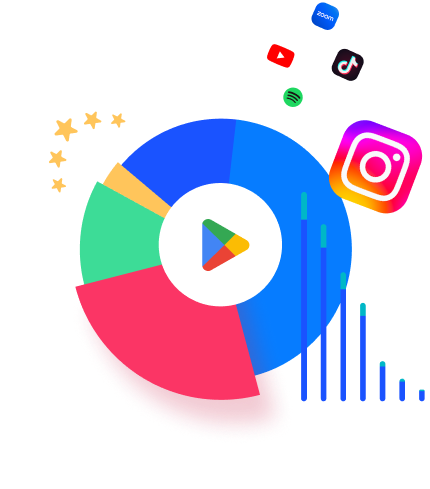App Market Overview: Korean Mobile Apps on Google Play
- How Many Mobile App Developers Are From South Korea? There are 6,221 Korean mobile App developers active on Google Play. Learn more!
- How Many Mobile Apps Have Been Built by Korean Developers? Out of the 1,825,140 apps available on Google Play, 25,572 were built by Korean developers. Learn more!
- How Many Downloads Do Korean Mobile Apps Have on Average? Korean mobile Apps average 2.67m downloads. Learn more!
App Ratings: Korean Mobile Apps
Apps Versus Games: South Korea
How Do Korean Mobile App Developers Monetize their Apps?
Korean mobile App publishers monetize their apps in the following ways:
- 11% of Apps must be purchased.
- 38% leverage mobile advertising.
- 12% have in-app purchases.
Globally, however, mobile App publishers monetize their apps like so:
- 3% of Apps must be purchased.
- 27% leverage mobile advertising.
- 10% have in-app purchases.
How Many Korean Mobile Apps Are Available on Both iOS and Android?
The Most Popular SDKs and Android App Permissions
- What Are the Most Common Mobile SDKs Integrated in Korean Apps? Currently, Android Support Library V4 ranks first, followed by Google Play Services and Google Firebase. See the full rankings here!
- What Are the Most Common App Permissions Used by Korean Mobile Apps? Internet Access is the most requested permission, followed by Network Information Access and Phone Sleep Mode Preventation. See the full rankings here!
Top Korean Mobile App Developers Based on Downloads
Most Popular Mobile Apps: South Korea
- Most Popular Mobile Apps in the South Korea: 시티즌코난 - 피싱아이즈 폴리스, 보이스피싱, 스미싱, ChatGPT, and 삼성닷컴: 갤럭시 S25 시리즈를 만나보세요. See the full list!
- Top Grossing Mobile Apps in the South Korea: 카카오페이지 KakaoPage, 네이버 웹툰 - Naver Webtoon, and TikTok. See the full list!
- Most Popular Social Apps in the South Korea: Threads, Karrot: Buy & sell locally, and Instagram. See the full list!
- Most Popular News Apps in the South Korea: 현지뉴스, News Today, and 모아진(Moazine). See the full list!
- Most Popular Travel Apps in the South Korea: Trip.com: Book Flights, Hotels, KakaoMap - Map / Navigation, and KorailTalk. See the full list!
- Most Popular Shopping Apps in the South Korea: 삼성닷컴: 갤럭시 S25 시리즈를 만나보세요, Temu: Shop Like a Billionaire, and 쿠팡 (Coupang). See the full list!
- Most Popular Lifestyle Apps in the South Korea: Mobile IDentification App, Bill Letter, and 우리동네GS (GS25, GS더프레시, 와인25플러스). See the full list!
- Most Popular Business Apps in the South Korea: 잡코리아 - 1위 커리어 플랫폼 취업 이직 인턴 채용, 알바몬 - 아르바이트 구인 구직, 일자리 매칭 플랫폼, and 사람인 - 취업 이직 커뮤니티 커리어의 모든 것. See the full list!
Get Even More Mobile App Market Intelligence!
The 42matters Explorer enables you to browse the global app market, with insight into publisher details, app metadata, performance metrics, technical insights, and more.
Our suite of APIs, file dumps, and other app and SDK intelligence tools can help you dig even deeper, with intelligence compiled from 12 leading mobile and connected TV (CTV) app stores, including Google Play, the Apple App Store, Amazon Appstore, Huawei AppGallery, Tencent App Store, Roku, Apple TV, Fire TV, Google TV, Samsung Smart TV Apps, the LG Content Store, and Vizio SmartCast Apps.
To learn more, set up a demo with our app market experts!



